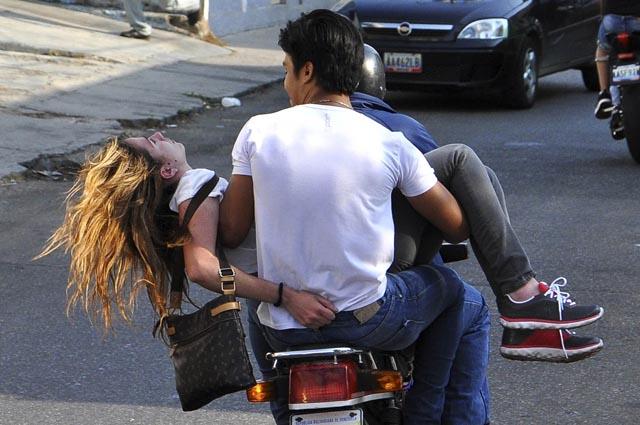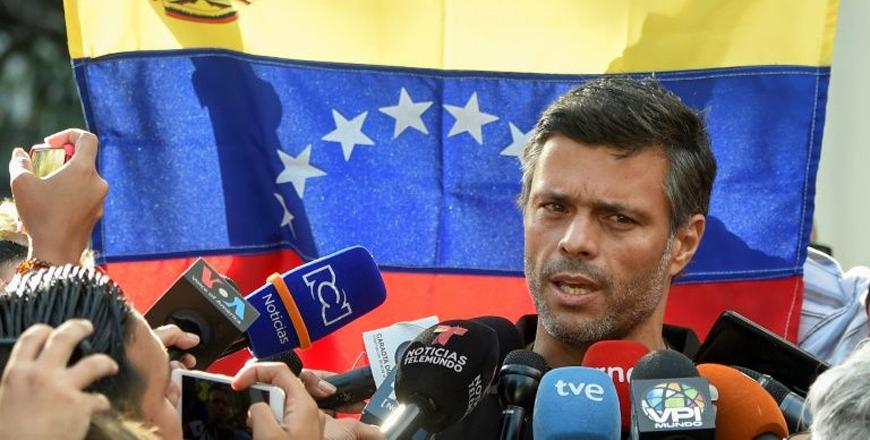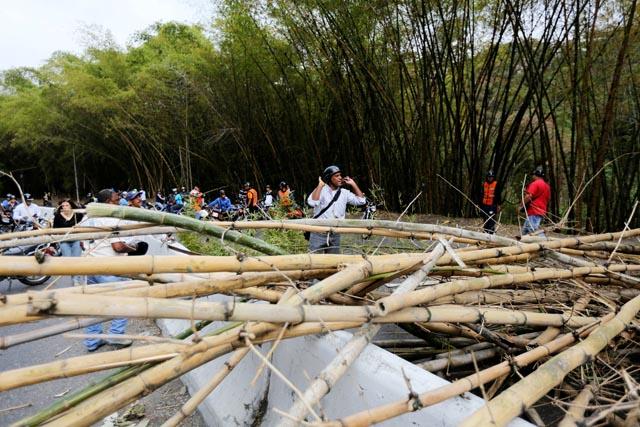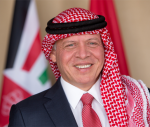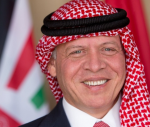You are here
Venezuelan opposition spurns government crisis talks
By AFP - Feb 27,2014 - Last updated at Feb 27,2014
CARACAS — Venezuela’s President Nicolas Maduro opened a national peace conference Wednesday after three weeks of sometimes deadly street protests, but most of the opposition stayed away, with one leader calling it a photo op.
Duelling demos of pro- and anti-government protesters took to the streets in a sign of the deep polarisation of this oil-rich but economically and social troubled country, where three weeks of demonstrations have left 14 people dead.
As he opened the conference, Maduro said: “We cannot just sit by and wait for events to escalate.”
The conference held at the presidential palace was attended by religious and business groups, intellectuals and governors mainly from the pro-government Chavismo movement named after the late populist leader Hugo Chavez.
Some opposition figures did show up. But the main umbrella opposition grouping known as MUD stayed away.
Maduro got an earful from the head of the business federation Fedecamaras, Jorge Roig.
“Mr President, our country is not well. We Venezuelans are killing each other and that is not acceptable. As head of state you are the one mainly responsible for calming things down,” Roig told the gathering.
The opposition’s main leader Henrique Capriles did not attend, dismissing the talks as a government photo op.
Venezuela has been swept by student-led protests since February 4, posing the greatest challenge yet to Maduro’s 11-month-old government.
Those who are on the streets say public anger over shortages of food and other basics, soaring inflation and rampant crime have served as kindling for these protests.
“Unless we all get out there and protest, we are not going to be able to get out of this really complicated situation,” said university student Andres Contreras, out on a Caracas street.
Venezuelan authorities said Wednesday they had arrested five intelligence agents for suspected ties to killings during protests against Maduro’s government.
On Monday, nine people were arrested in the same case including three SEBIN intelligence service members, and the rest police.
“Why should we have to live like this?” demanded demonstrator Adriana Diaz, a 48-year-old lawyer banging on a cooking pot, one of the symbols of opposition defiance.
“The government should listen to people, and hang the economic system.”
Maduro has responded to the street protests with force, arresting scores of demonstrators as well as a prominent opposition leader, Leopoldo Lopez.
Caracas was relatively peaceful Wednesday after a night of occasional clashes in the capital.
But the opposition and the government staged separate marches, in a vivid display of the polarisation roiling a country with the world’s largest oil reserves.
Several thousand women dressed in white marched through the city to a military barracks to demand “an end to the repression and violence by the security bodies”.
“We know that it’s the Cubans, an invading army, who are giving the orders,” said a document the women brough to the barracks. “Don’t let them.” Communist Cuba is Venezuela’s main political ally.
Lopez’s wife, Lilian Tintori, led the march with opposition deputy Maria Corina Machado.
Meanwhile, thousands of government supporters marched towards the presidential palace to rally for “peace” and against what Maduro insists is an opposition “coup d’etat”.
Maduro has sought to deepen the socialist, anti-American policies of his charismatic predecessor and mentor, the late Chavez.
The United States voiced some optimism.
“We’re prepared to have a change in this relationship, this tension between our countries has gone on for too long in our view,” US Secretary of State John Kerry said Wednesday.
“But we are not going to sit around and be blamed for things we have never done,” he added.
On Tuesday, the United States announced it would expel three Venezuelan diplomats, a tit-for-tat response to the expulsion of three Americans by Caracas last week.
The US action came the same day that Maduro’s government named a new ambassador to Washington.
The two countries have not exchanged ambassadors since 2010, reflecting the bad blood that has prevailed between the two trade partners since Chavez came to power in 1999.
Related Articles
Opponents of Venezuela’s leftist government prepared for a mass protest rally in Caracas Saturday, a day after President Nicolas Maduro issued a surprise call for direct talks with the United States.
MADRID — Leopoldo Lopez, a Venezuelan opposition figure who has sheltered at the Spanish ambassador’s residence in Caracas for 18 months, ha
Anti-government demonstrators set up barricades and started fires in Venezuela’s capital on Monday despite calls from within the opposition to rein in protests in which at least 12 people have died in the OPEC nation.


